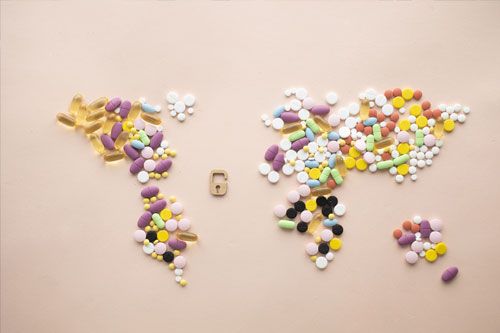
| 0 Prodotti | - | CHF 0.00 |
| Aggiungi al Carrello | ||
Antimicrobial Resistance: The Silent Pandemic
Throughout history, bacterial infections have posed a continuous threat to our health. When antibiotics were discovered, life-threatening infections suddenly became treatable. However, their effectiveness is now in jeopardy because a number of antimicrobial treatments that once worked, no longer do so because microorganisms have become resistant to them. This means that infections that we never thought could turn lethal could once again become life-threatening. If we do not act, the trend is the start of a very serious situation. A silent pandemic.
What is antimicrobial resistance?
Antimicrobial resistance (AMR) occurs when bacteria, viruses, fungi, and parasites change over time and no longer respond to medicines, making infections harder to treat and increasing the risk of disease spread, severe illness, and death. As a result of drug resistance, antibiotics and other antimicrobial medicines become ineffective, and infections become increasingly difficult or impossible to treat.

What causes antimicrobial resistance?
One key factor that contributes to the rise of AMR is the overuse and misuse of antibiotics. Patients often demand antibiotics for viral illnesses, such as the common cold, for which antibiotics are ineffective as they are caused by viruses, not bacteria. Moreover, antibiotics are frequently used in agriculture to promote animal growth, contributing to the problem.
Another major factor is the inadequate control of infections in healthcare settings, allowing the spread of resistant pathogens from one patient to another as well as from healthcare workers to patients.
Furthermore, the lack of new drug development has significantly slowed down in recent years due to scientific, economic, and regulatory challenges, which exacerbates the problem.
What are the consequences of antimicrobial resistance?
AMR has serious implications. It can lead to longer, more severe infections with higher mortality rates. The economic burden is also important, as costly treatments and extended hospital stays exert pressure on healthcare budgets. Moreover, medical procedures that rely on antibiotics, such as surgeries and chemotherapy, become riskier in the presence of AMR.
This silent threat knows no borders, presenting a global health crisis that respects no geographical limits.
Thus, what can we do to stop this silent pandemic?
We need to:
- Be careful with antibiotics. Healthcare providers must prescribe antibiotics wisely, and patients should avoid pressuring doctors for unnecessary antibiotic prescriptions, particularly for common colds and other viral infections.
- Implement strict infection control measures in healthcare settings. These measures are crucial for preventing the spread of resistant pathogens.
- Develop new medicines. Greater innovation and investment are required for the research and development of new antimicrobial medicines, vaccines, and diagnostic tools.
- Raise public awareness about AMR, emphasizing the importance of responsible antibiotic use.
To prevent the serious consequences of AMR, we need to act now. By promoting responsible antibiotic use, improving infection control, fostering innovation in drug development, and raising public awareness, we can work together to prevent this silent pandemic from becoming a worldwide health crisis.
#AntimicrobioalResistance #SilentPandemic #ResponsibleAntibioticUse #NewMedicines #ActNow #GutHealthMatters #HealthBlog #Blog #StayInformed #Knowledge #AllergyCare
C. Dominguez, 22.11.2023
AllergyCare AG
Vordergasse 43
CH-8200 Schaffhausen
-
Questo indirizzo email è protetto dagli spambots. È necessario abilitare JavaScript per vederlo.

